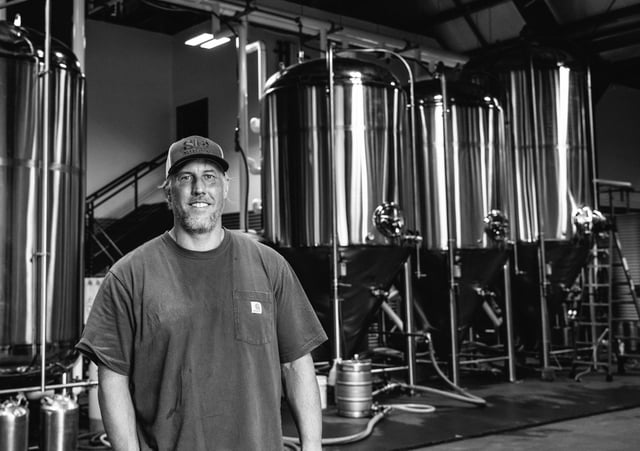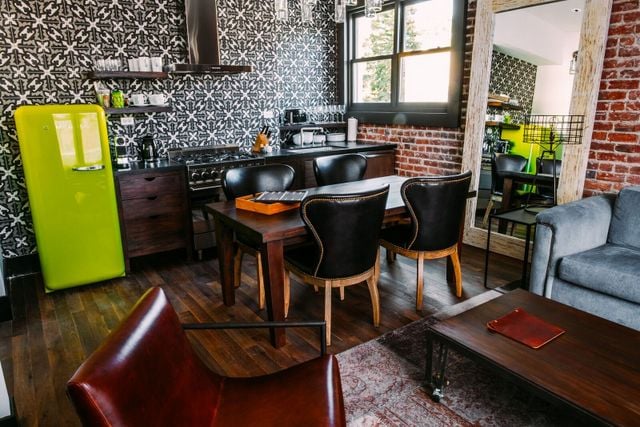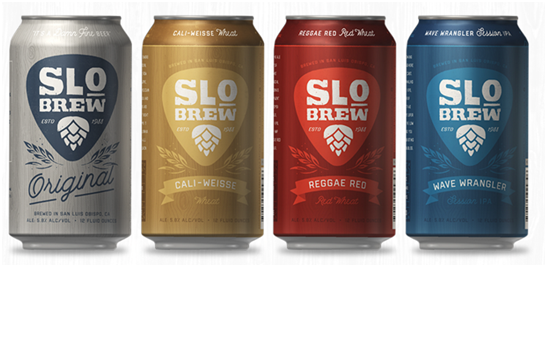
CBB: Steve, we really appreciate you taking the time to talk to us today. I know you and SLO Brew are super busy right now. For starters, you guys and gals are working on a bunch of new facilities this year.
Courier: Yep, we just moved into our new pub, which had been operating in the same spot since ‘88. Then we also opened up a production plant, in the same town but just on the outskirts of town. It’s been in the planning stage for several years, but we actual broke ground in January.
On top of that, you’ve also revamped your marketing.
We’ve got all new logos. We are working with a local but nationally known company called Rosetta. They do a lot of work with a lot of bigger businesses. We can actually see their building from our building, so we teamed up with them, and they came out with a whole new look. It’s cool. I like it a lot better than the old look. It’s basically a pick badge, because we’ve always had music as part of our theme, and so they came up with the pick badge look, and I like it a lot.
It looks very cool. I love that your pub has a great lineup of artists coming through there.
Yeah, we have a long history of lots of good music.
Very cool. And the new place has a loft or lofts above it as well? Is that right?
Yeah. Our downtown area is a nice area, but there’s no place to stay. There are no hotels. They’re all on the outskirts of town, so there’s been a push by the city to get more lodging downtown. There was actually an original plan to make it a big concert hall, on the second story, and it was met with some resistance from the city, so we had to change gears and downscale the concert venue. As part of that, to make it make sense on paper, they decided to do a boutique hotel.

That’s cool.
It’s cool too because then the bands that do play, they can go up there. There’s a big meeting space that they can enjoy. That’s their backstage area now, up there.
Very nice. It also gives it a destination kind of feel to it.
Yeah. The people that are really into craft beer can post up there, and there’s quite a few breweries right around us, too. There’s Libertine, which is all wild ales, Barrel House, which is a brewery up in Paso; it has a tasting room. There was a little brew pub right around the corner called Creekside. They’re actually in transition right now to new ownership, and then Figueroa Mountain, which is another regional brewery in our area, is looking to open a tap room downtown. Then right across the street, there’s an iPourIt place, so a bunch of craft beer on tap where you can go and pour your own and explore a lot of craft beer there. There’s a lot in our immediate downtown area happening for beer lovers.
Things have changed in the last couple years, huh?
Yeah. Our beer scene is definitely starting to grow.
You guys have been around for so long. I think I heard the other day a stat about California having maybe topped 700 breweries. Does it feel different out there? There are so many now.
It does. I like it better. I’m a brewer, so I like being able to interface on a regular basis with other brewers. I think you get a little more creative energy going with everyone. You don’t get as stagnant. The brewing industry’s always been known for being very friendly with other brewers, so it’s nice to have a community of brewers.
You yourself have committed full-time to SLO Brew recently. Is that right?
Yeah.
What encouraged that commitment? This expansion?
Yeah. There was a lot going on, and I was at Firestone Walker for 15 years, and it was going the opposite direction there. It was getting bigger and more corporate, and they got bought out, and it became more like a factory. It’s still a great company. I’m not pooh-poohing them at all. They’re great, but I was commuting. I’ve always lived in San Luis, so I was always commuting a half-hour to Paso. It gave me an opportunity to actually expand my knowledge base because I was always in production at Firestone. Now, I’ve gotten into packaging a lot lately and every facet of brewing now. Also, I literally live three minutes away, so it took the commute out.
Nice.
SLO Brew’s always been a great brand. It wasn’t really even a decision. It kind of was a no-brainer.
What have you learned doing all these new things? Anything that stands out, like, “Oh, I guess I wouldn’t have thought of that?”
Definitely packaging. I was always pretty anti-packaging. Brewers like to just be production. I definitely got thrown into it, but I’m super glad that I did because it expanded my knowledge base. I’ve learned a ton from packaging, but actually, it’s more of the process. I always had my baseline of what I wanted from packaging, as far as CPOs [change package orders] and such. It’s been good to be able to plug that in while we’re developing this packaging and make sure that those criteria are being met.
It’s so important these days. Tell me about the new production facility. You have a new canning line there.
Yeah. It’s a rotary, six-head, automatic Criveller canning line. It’s actually super pro, but it’s only six heads, so it’s just like any big, rotary canning line that you would find, but it’s small.
What do you like about the brand?
Criveller? Our whole brewery is basically Criveller. The brewhouse, they pretty much have outfitted everything. We went with the full package with Criveller.
Why do you like them?
They’re great. I like them a lot. The equipment has been great, but one of the main reasons we signed on with them is the tech support. They have a technician in our area. As it is with most machines, things happen, and he’s been a Johnny-On-The-Spot. Whenever we have something go wrong, he’s right there to help us, so that’s been one of the best things that I can say about them.
 What’s important when you’re planning that canning line? Is there anything you need to keep in mind for other brewers thinking about expanding into cans?
What’s important when you’re planning that canning line? Is there anything you need to keep in mind for other brewers thinking about expanding into cans?
Well, canning, for them, is a new endeavor. They’re just rolling it out. The idea is that we become kind of a showroom for Criveller for other prospective buyers for them. They can refer those people through here, and they can see everything that they offer, basically. That was the incentive for them to push all that for us.
Interesting. Can you give us any sort of maintenance or operational advice when it comes to a line? What things people working the line need to consider and be aware of or any sort of maintenance issues that need to be kept up on weekly or monthly?
We’ve had some issues, actually, with our canning line, but some of it has to do with operator error. There was a guide, a can guide, on the line that, when you CIP the line, when you clean the line, you have to take this guide out. One of the operators didn’t take this guide out. A canning line is such a fine-tuned piece of machinery that the rotary hit this guide, and it has essentially thrown everything out of whack.
Oh, man. Training’s important.
Yeah, training’s important, and this is one of those things where we’ve advised Criveller, on their future models, that they do some kind of proximity switch for this guide, because it’s super easy to forget. I wouldn’t even put it down to training because this guy knew about it. He was told about it, but he still forgot it. For their future models, we suggested that they put a proximity switch, so if that guide’s still in there, you’re not able to do the CIP mode. There’s a lot of little things like that.






Leave a Reply
You must be logged in to post a comment.